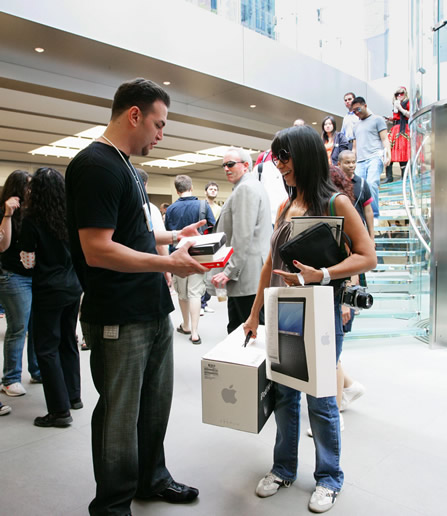Want to Have Less Debt and Save More?
publication date: Jul 15, 2009
The great Ben Franklin said many wise things and invented and accomplished a lot in his lifetime. He even had some great personal finance insights including his saying, "Beware of little expenses. A small leak will sink a great ship."
How true!
Most people can think of 101 things they'd rather do than track their spending. However, just a little bit of effort can pay big dividends that last a lifetime. Knowing where your money is going will empower you to make changes in your life and help you reach your financial and personal goals.
Different people have different ways to track and manage their spending. What works for one person won't necessarily work for another, simply because each person approaches spending, budgeting and saving differently.
Rather than seeing this exercise as drudgery, look upon it as the first step toward using your money more efficiently -- more powerfully -- to maximize your satisfaction. Along the way, you'll also see how budgeting and expense control can lead to extra benefits such as reducing your tax bill.
To start taking charge of your spending habits, it helps to have some concrete "evidence" of where your money is currently being spent. While you may have a guess of where most of your money goes each month, having the facts can be a real eye-opening experience.

Determining Where Your Money Goes
You work hard for your money so you owe it to yourself to make the most of what you are earning. Part of making the most of your money is to be careful not to let so much of it slip out of your hands after you earn it.
In order to track your spending easily, you should separate it into categories into which you separate your spending information. Within categories, there may be subcategories that allow further detailing of how you are spending your money. The following are some examples of categories and subcategories:
Housing:
- Rent
- Mortgage
- Property Taxes
- Gas & Electric
- Water
- Internet
- Federal
- State
- Social Security
Groceries
Subscriptions & Memberships
To track your spending accurately, make sure that you capture all the different ways that you spend your money. That's why you need your check book register, credit card statement and anything else which documents where you're spending your money.
Transactions that you do with cash present another challenge. Suppose you typically spend cash to buy lunch out as well as a few bucks here and there on a magazine or coffee. How do you collect this data and mesh it with your other spending? One option is to estimate. This is quick but suffers from the selectivity and accuracy of your memory. Another option is to be more systematic and keep a little notebook (or PDA) with you for a week or two and record every cash purchase and what it was for. It is more time consuming and you risk odd stares from strangers and friends, but it is much more precise. Furthermore, the process of tracking your every financial move may cause you to change your normal spending habits. Remember, the point is to get an accurate snapshot of how you generally spend your money.
Don't get too bogged down in the details.
Having the data on where your monthly income is being spent is powerful information. But don't sweat it if you aren't able to track every last penny. In fact, to get 100 percent of the details perfect, you're likely to spend far too many hours that you won't enjoy (time you probably can't spare anyway in your busy schedule).
This is a case where the 80/20 rule works well. This says that 20 percent of the work or data provides 80 percent of the value. In some endeavors, such as the construction of an airplane, every detail counts and could lead to disaster if it's not perfect. The good news with your money matters is that that's not the case. Forever tracking every last dollar and cent you spend could lead to a boring existence and would probably drive you and your family crazy!
Differentiating Necessities Versus Luxuries
One major financial danger is that what used to be thought of as a luxury, over time, becomes thought of as a necessity. Automobiles, when they were first built in the early 1900s were a luxury. Most people got around through other, less costly methods. Televisions arrived on the scene a few decades later and went through a similar adoption process.
Today, cars and televisions, including multiple ones, are considered necessities. In some households, there's almost one car and one television per person! Are cars and televisions necessities? Of course not. You can live without both. Besides the money you could save on the purchase and upkeep of these devices, some would argue that not having these trappings of modern life could improve the quality of your life. Consider the benefits of not having a car: No more insurance premiums, no more parking hassles and increased exercise and sunshine from walking.

You may not be willing or easily able to give up your car. Your commute and other commitments may require a car. That's fine. However, you should question all the things you spend your money on, to prioritize what's most important and reduce spending on those items that are not. These are personal choices, but all choices come down to making tradeoffs. This includes where you live, where you shop, as well as what you buy. Although some people will tell you how they think you should be spending your money, ultimately, only you can decide.
Is the second car more or less important than a vacation abroad? Are you willing to give up regular clothing purchases or would you rather quit your gym membership and start exercising in other ways?
Remember, if you're not saving what you need to accomplish your personal and financial goals, either you have to spend less or earn more. For most people, spending less is more realistic. Once you're able consistently to save the amount you desire, how you spend the rest becomes less relevant.
Most folks have some difficulty saving as much of their income as they'd like or need to in order to achieve their financial goals. A relatively easy way to fix this problem is to be more realistic with your goals. Many people, for example, aren't able to buy a larger home and retire by age 55 by saving just 5 percent of their annual earnings (unless they have a lot of money already)! You would need to work a little longer, save more and perhaps reduce the lifestyle expectations you have for retirement.
Two Budgeting Strategies That Work
Once you know where your money is going in a typical month, you're in a position to start making some changes. One of those changes could be to plan ahead with your spending - a process called "budgeting."
Some people budget for the same reason that businesses do - so that the difference between the amount of money coming in and going out is not left to chance. Suppose that you analyze your past six months' worth of spending and realize that you're saving just 5 percent of your income. Perhaps you set as a goal saving 10 percent of your income. How do you accomplish that? You can go through the various spending categories and set targets that cut your spending enough so that your rate of savings increases to 10 percent. That's what budgeting is all about.
Here's an example. Suppose that your annual income is $40,000 and that you're currently spending $38,000 per year and saving $2,000 per year (5 percent of your income). You'd like to be saving 10 percent of your income or $4,000 per year. So, you only need to come up with $167 more per month to reach your higher saving's goal. After reviewing your recent spending, you determine that you can make cuts in the following categories:
Monthly Average Budget Difference
Dining (Meals Out) $ 250 $ 175 $ 75
Entertainment $ 170 $ 120 $ 50
Taxes $1000 $ 958 $ 42
Total $167
By cutting your spending on meals out and entertainment by a total of $125 per month, you can funnel that savings into your employer's tax-deductible retirement savings plan. This tax break -- assumed for this person to be worth about one-third of the retirement plan contribution -- reduces the taxes and gets the person to their goal. Saving $2,000 more per year wasn't so difficult after all!
Budgeting is not perfect and it offers no guarantees. All a budget represents is a plan or set of targets. You may plan to cut your spending on meals out by $75 per month but whether or not you do in actuality is another matter. Don't let temptation get the better of you!
There are two common ways to develop a budget. The first method involves examining each of the spending categories and developing your best estimate for how much to reduce in each. Most people will cut more in some categories than others. Only you can decide which expenditures provide you with the most value. It involves tradeoffs, and it is rarely easy.
The other method of budgeting is to start from scratch. Rather than looking at changes to your existing spending, you figure out how much you would like to be spending in the different categories. You start with a clean slate so to speak - you're not constrained by starting with or examining what you're currently spending. The advantage of this approach is that it allows for a more significant change. The disadvantage is that the estimates can be unrealistic.
Almost everything is fair game for change in the long haul. In the short-term, some expenses are easier to reduce than others. People who have difficultly saving money have a tendency to think of everything in their budget as a necessity. Except for food, clothing, shelter, and legally required tax payments, most of what else we spend money on is a luxury. The reality is that there are opportunities to spend less on many items that seem like necessities, or, at best, are things we spend money on mostly out of habit.
Develop a plan and check back periodically to see how you're doing. You may go over a little in one category but you might be able to make up for it by staying "under budget" in another.
Part of smart spending and budgeting involves keeping an emergency cushion for unexpected expenses. What if you lose your job or your roof springs a leak? What if both of these unfortunate events happen at the same time! How would you stay afloat?
Ideally, you should have an emergency reserve of at least three months' worth of living expenses in an account that is liquid and accessible without penalty. The "riskier" and more volatile your income is, the greater the reserve you should have. If your job is unstable and you have no other family members to turn to for financial help, you may want to keep as much as a year's worth of money in your emergency reserve.



